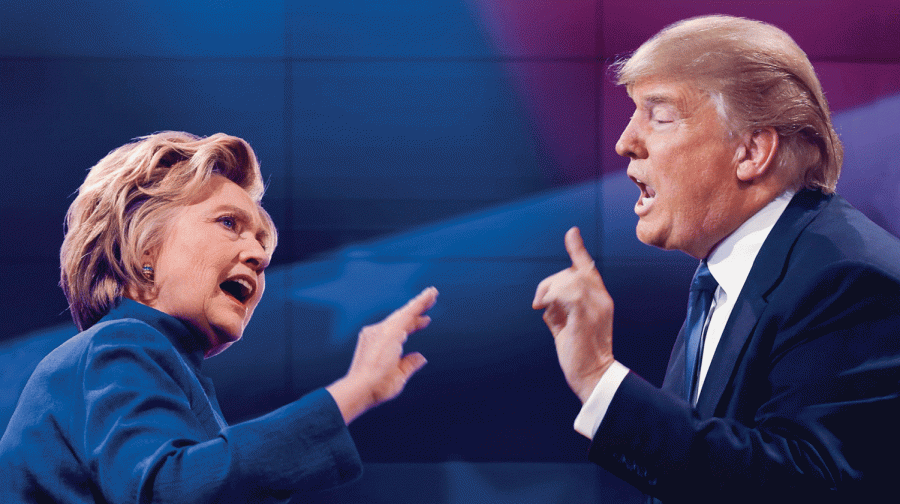The Election from an International Perspective
On Saturday, October 29, the Peace and Conflict Studies (PCON) department held a panel discussion that focused on the 2016 presidential election from an international perspective.
The discussion’s panelists included Professor of Sociology and Africana and Latin American Studies Jonathan Hyslop, Assistant Professor of Geography Teo Ballve, Professor of Anthropology and Peace and Conflict Studies Nancy Ries and senior Julia Taibl, who is currently conducting research on the Russian perception of U.S. elections. Coming from unique international backgrounds, the panelists analyzed how Latin America, Britain and Russia view the 2016 presidential election.
Presenting caricatures of Hillary Clinton and Donald Trump to the audience, Ballve started by introducing the Latin American perspective on this election. According to Ballve, Trump supports populism, a political ideology that is popular in some parts of Latin America.
“Populism evokes antagonism towards minority groups. Hatred is its company, and nationalism is its guard,” said Ballve.
Clinton, on the other hand, is viewed by Latin Americans as someone who would maintain the status quo. U.S. policy towards Latin America has been one of trade deregulation and liberation. There has also been strong enforcement of the War on Drugs. Ballve argued that the former Secretary of State is likely to maintain these policies.
Born in South Africa and a former resident of England and Germany, Hyslop talked about South African attitudes toward this presidential election.
“South Africans define themselves as culturally American, but dislike both Republicans and Democrats,” Hyslop said.
Hyslop stated that this intense dislike dates back to Reagan’s policies during the apartheid period; the U.S. intervention in the Iraq War was also extremely unpopular among South Africans. In general, South African people dislike both candidates, though Barack Obama and Bill Clinton are well-liked.
Hyslop then argued that, to the British, there is a parallel between Brexit and Trumpism. Both gain support from people who think that the economy is not going well, and that the nation is unable to assert itself adequately. Hyslop stated that mainstream media disapproves of Trump, and even former Prime Minister David Cameron, who in Britain is far to the right of the political spectrum, considers Trump “divisive, stupid and wrong.” In Germany, too, Trump is not receiving much support. As the Cuban Missile Crisis is still fresh in memory, Europeans worry that their continent would become the battlefield of the “cold war.”
“Trump would be a dangerous person to hold nuclear weapons,” Hyslop said.
Ries, a cultural anthropologist, discussed the Russian perspective on the election. She explained that Russia wants Trump to win, though its citizens view neither candidate in a particularly positive light.
“Analyzing the political timeline [of relations between Russia and the United States] is an important element in the process of evaluating the situation in Russia,” Ries said.
The Soviet Union fell in 1991. Bill Clinton was elected president the following year. During Clinton’s presidency, the U.S. assisted Russia in privatizing their economy, which in practice took many resources away from the civilians. To the Russian people, the memory of Clintonism largely involves the memory of poverty.
Ries then stated that many Russians do not like Barack Obama due to their racism, and do not like Hillary Clinton due to their sexism. They also tend to connect the two with each other, which makes Hillary Clinton carry the stigmatizing tag of being both “black”
and a “woman.”
Ries stated that Russians are also aware that Clinton will not change America’s policies towards Russia. Putin is very critical of the United States and sees the U.S. as the troublemaker in the world, but he does not critique his own militarism. He sees Trump as someone who has joined this criticism of the U.S. with him.
Taibl, who is writing a senior thesis involving Russia, also provided some interesting details regarding the Russian perspective. When reading a Russian newspaper, she found that very rarely is Clinton mentioned first. Newspapers usually mention Trump first, referring to him as “billionaire Republican Donald Trump.” They have also written that “a victory for Hillary Clinton means a second Cold War.”
After the panelists convened their discussion, the panel was opened to Colgate students and their family members, who asked questions and shared opinions. Many attendees enjoyed the panel discussion.
Senior Angelica Smith attended the panel and appreciated the unique dialogue between panelists.
“It is interesting to see other countries’ perspectives,” Smith said. “I hardly thought about our election from a global perspective.”







